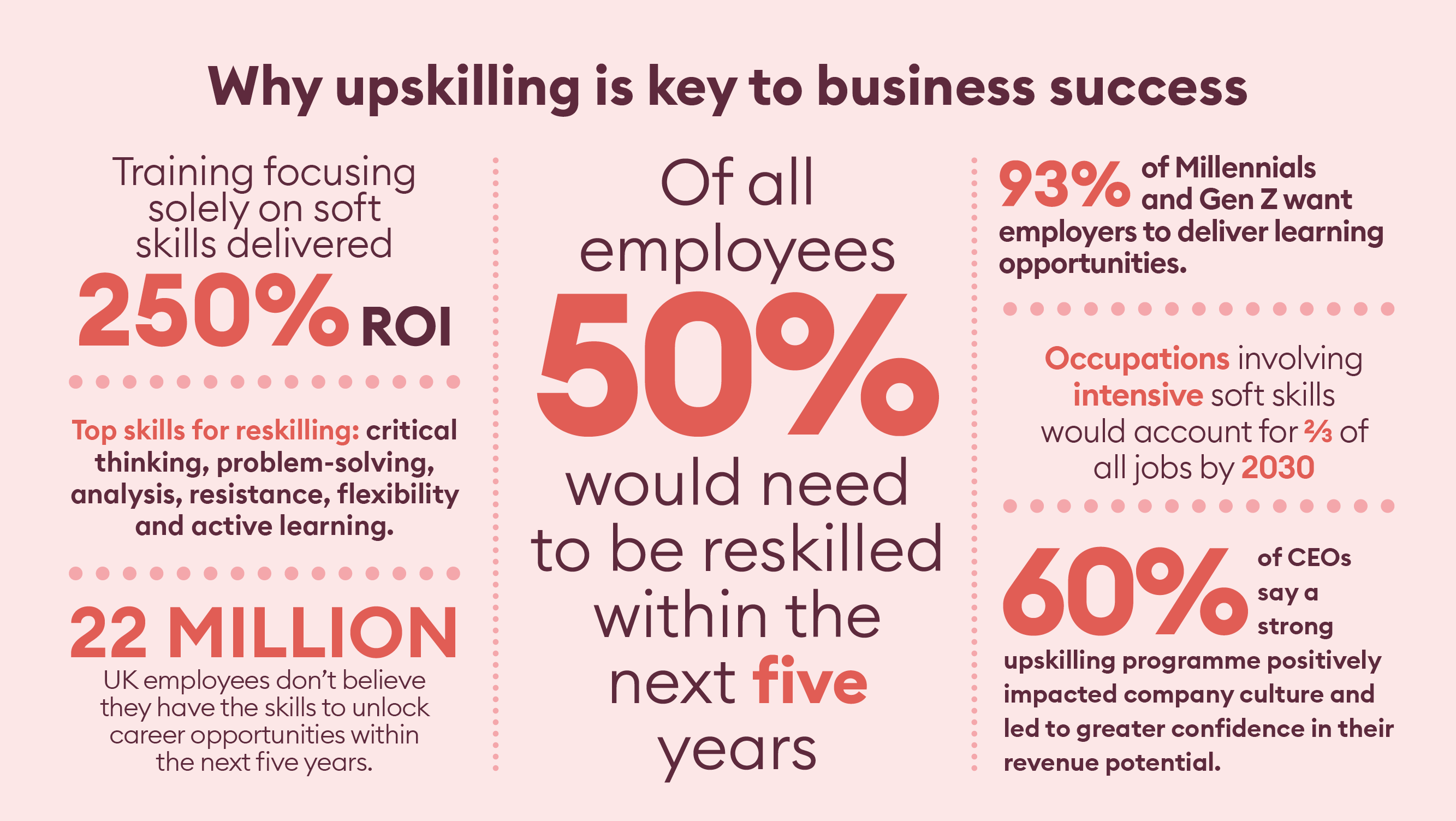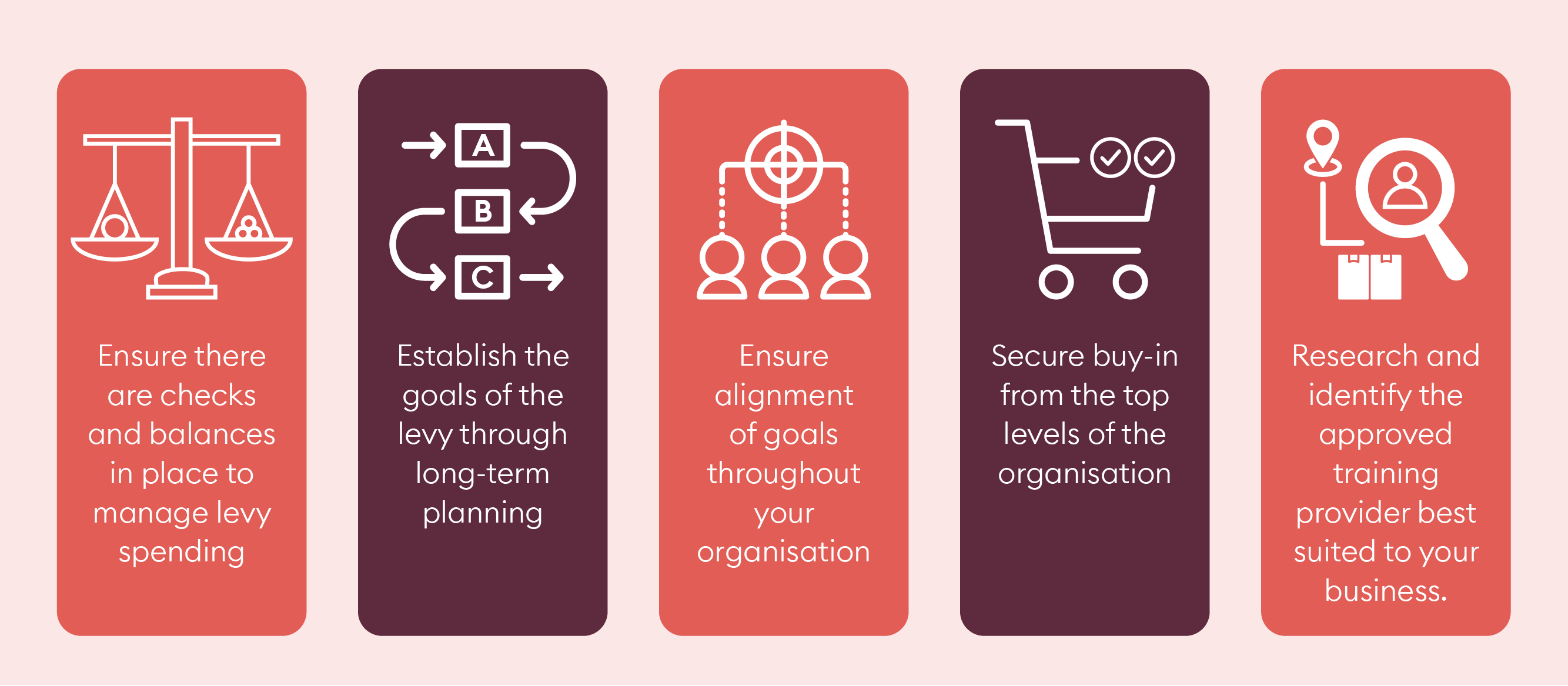If you’re looking for ways to improve and grow your business, upskilling your staff is the obvious solution.
In a time when employees have more power to choose where, when and how they work, and amid the Great Resignation, upskilling your team brings several advantages.
Unfortunately, many employers are neglecting this employee must-have. They hear the word ‘apprenticeship’, think about the cost and dismiss the idea. This is despite large companies making payments to the government intended to help them cover the costs of apprenticeship training.
That payment is a tax called the Apprenticeship Levy. And what surprises many is that any business employing staff can access the massive amount of money collected by the government as a business tax.

Interested in finding out more about how you can upskill your team for free? Book a no-obligation call with our team.
Launched by the English government in April of 2017, the Apprenticeship Levy is a tax aimed solely at businesses with an annual employee bill of more than £3 million.
Any business that meets that criteria pays an additional 0.5% of its monthly payroll bill to the levy tax. That money is then added to their Apprenticeship Levy allowance.
The Apprenticeship Levy was introduced to encourage businesses to invest in apprenticeship training. By levying money from England’s most successful businesses, the aim is to increase how many apprenticeship opportunities are available. The money raised through the Apprenticeship Levy is used to fund apprenticeship training and support businesses in meeting the cost of apprenticeship programmes.
It’s been a huge success for those businesses that have used the levy funding to upskill their teams. But there are still businesses not taking advantage of the opportunities provided by the levy or the Apprenticeship Levy allowance. Even with the Apprenticeship Levy explained, it’s easy to overlook its benefits.
As the apprenticeship landscape continues to evolve, businesses are overlooking the many opportunities available to them.
Read our case study about how airline firm easyJet used its Apprenticeship Levy fund to upskill its leadership team.
If the annual wage bill of your business is lower than £3 million, your business won’t be paying the Apprenticeship Levy. But that doesn’t mean you can’t access the vast sums of money paid into it.
Even if your annual wage bill is significantly lower than £3 million, you can access the funding provided by the levy. This can be for up to 10 of your team members, with the government covering up to 95% of the training cost. No matter what sector your business trades in, you can take advantage of the Apprenticeship Levy.
As a small- or medium-sized business (employing less than 50 people) with an annual salary bill of less than £3m, you are not required to pay into the Apprenticeship Levy.
However, any levy funds that are unused by bigger companies after 24 months are transferred back into the government – that money is essentially lost to the original levy-paying employer.
If a large employer is not able to use the money set aside to fund apprenticeships within their own business, they can choose to transfer up to 25% of that levy to other employers.
Small businesses can then apply for an Apprenticeship Levy donation to help with funding their apprenticeships.
It’s no secret that the UK is seriously lagging behind other countries when it comes to leadership skills. While there has been a gradual increase in hard skill development, core employability skills are falling by the wayside. And that’s proving a big problem.
Human skills, such as communication, problem-solving and career management, are the single most transferable skills in the workplace. The pandemic accelerated the already evolving workplace, and modern business looks very different than it did even a few years ago.
Employee retention is more challenging than ever. As employees demand more from their employers, business leaders need to reconsider their approach to hiring the best talent and keeping them on board. This dramatically affects the costs of hiring and onboarding — high costs that play a large role in guiding business growth.
Measures such as introducing more flexible and hybrid work, wellbeing strategies and improving workplace diversity are slowly being recognised as must-haves in the era of the Great Resignation. But far fewer firms are recognising the inherent value of offering learning, development and progression opportunities.
The result is that they aren’t keeping the staff they need. Those employees are searching for greener pastures, and if you aren’t providing them with the potential to grow as leaders, you’re not giving them the tools they need to succeed.
When you pivot to an upskilling mentality, you gain some serious advantages. Let’s look at some stats.
What does all this mean? It’s clear that investing in your team will only strengthen your organisation. When you improve the skills of your team, you can inspire new talent, maintain positive wellbeing and build a more skilled, more motivated workforce. That’s the key to boosting your productivity and driving a more potent level of performance.
As the war for talent can only grow increasingly competitive, smart leaders look inward, seeing what their employees need and delivering on those needs. While many leaders are watching technology as the future of the workplace, tech isn’t what makes for a workforce. Instead, it’s empowered leaders who can empower their teams — and by doing so, unlock their potential and the potential of their business.

When the government wants to give you money, it’s always smart to take it. Not taking advantage of the Apprenticeship Levy is a potentially destructive business strategy.
Wherever you’re placed within your organisation’s hierarchy, the advantages of upskilling your team are obvious. The challenge then becomes implementing this new approach to employee development and retention. It may seem daunting, but it can be achieved in as few as five simple steps.
With a clearly defined plan, actionable goals and top-level buy-in, utilising the Apprenticeship Levy will become a seamless process. And by implementing robust upskilling within your organisation, you ensure that you gain an immediate advantage over your competitors while positioning yourself more securely in today’s hyper-competitive business environment.
The business world is facing some unique challenges right now. Some of these are driven by a global pandemic, some by bleeding-edge technology. By upskilling your team and investing in their potential, you meet those challenges head-on and take advantage of them — using challenges as a growth motivator.
The key roadblocks to business growth and sustainability include:
A sudden shift in workplace location, with some members onsite and others dispersed (often globally), means challenges for wellbeing, leadership and team morale. Even business basics become more challenging, such as adopting the new rules of effective virtual meetings. There are clear benefits to upskilling with Level 3 to 5 leadership and management apprenticeships. But you don’t just earn the obvious benefits; you equip your emerging talent with the tools you and they need.
When team members are promoted to the management level based on experience or skill, they are often left without any training on how to lead. This leads to fragmented workforces: inefficient, unmotivated and unproductive. Retention becomes the biggest workplace challenge rather than growth.
A diverse workforce has long been proven to be more effective, motivated and willing to adapt. And yet the goal of diversity is often reduced to box-ticking and hindered by unconscious bias. The result is weaker organisations. At a leadership level, a monoculture is a roadblock to new initiatives and ideas. But with the right training, your team can learn how to take full advantage of diversity in the workplace, with obvious results that have a positive real-world impact on your bottom line.
Take a look at our leadership and management courses, all of which can be funded by the Apprenticeship Levy.
Babcock International is a leading global defence and aerospace firm that faced a unique challenge in upskilling its leaders. Employing a global workforce of more than 34,000 people, they needed to source a more democratic learning environment that delivered accessible learning resources to their leaders, wherever they were.
After reviewing our available courses, they decided to partner with Future Talent Learning and take advantage of the benefits provided by the Transformational Leadership Programme to meet this challenge.
But that wasn’t all. They also wanted to ensure that the learning opportunities could be scaled while maximising efficiency so that future leaders within the firm could develop the leadership skills and mindsets required to take Babcock into the future.
In our interview with Craig Smith, Head of Learning and Employee Experience at Babcock, he said: “This programme goes further than just helping learners develop their soft skills by providing plenty of opportunities for them to apply their new skills and knowledge to real-life business problems. There’s also a big focus on taking their development further by exploring the many stretch resources provided.”
Starting with an initial trial that included 17 employees based in the UK and Europe, Babcock used the 100% virtual Transformational Leadership Programme in 2020. Learners accessed apprenticeship Levels 3 to 5, with 12- and 15-month programmes. Throughout the programmes, those learners covered topics such as communication, decision-making, self-awareness and self-management.
The nature of the Transformational Leadership Programme meant those 17 participants could begin developing their leadership soft skills from day one. Making maximum use of the unique tripartite coaching model, line managers were just as involved as the learners.
The results had a very real impact on the day-to-day management of Babcock International. So much so that the firm has since committed to additional cohorts. In 2021, more than 50 employees from Babcock were inducted into the programme, with several hundred expected to take part in the future on a rolling basis.
Not only did Babcock access the Transformational Leadership Programme from Future Talent Learning using the Apprenticeship Levy provided by the English government, but they also saw real workplace outcomes. Those who have participated said they have an improved level of confidence in terms of their leadership skills and that the learning programme supported their current role while making it easy to see the future benefits on a personal and organisational level.
Craig Smith, Head of Learning and Employee Experience, Babcock
Read the full Babcock International case study here, or dive into the in-depth interview with Craig Smith here.
From improving productivity to enhancing employee and leader wellbeing, organisations using the Apprenticeship Levy to upskill their brightest and most promising team members are gaining the edge over their competitors. When leaders in England are often lacking the necessary skills to successfully navigate the modern, evolving workplace, those businesses that make the mistake of dismissing the Apprenticeship Levy will only fall behind.
Transferable leadership skills are a vital component of employee development. As we continue to face a leadership skills gap, owners of English businesses must use the Apprenticeship Levy in the most effective and high-impact way.
In a world where work is shifting and changing at an ever-accelerating pace, we’ve reimagined apprenticeships.
Do you need help understanding the Apprenticeship Levy and how we can support you with developing your team’s leadership skills? We have courses available for all leadership levels, including graduates, aspiring managers, middle managers and senior leaders.
Arrange a call to find out how to use the Apprenticeship Levy to upskill, reskill and retain your existing employees and win in the war for workplace talent.
Want to read the full article at your leisure or share it with a colleague?
Enter your details and download.




Change Board Holdings Limited,
trading as Future Talent Learning,
Main Apprenticeship Training Provider
UKPRN 10084912